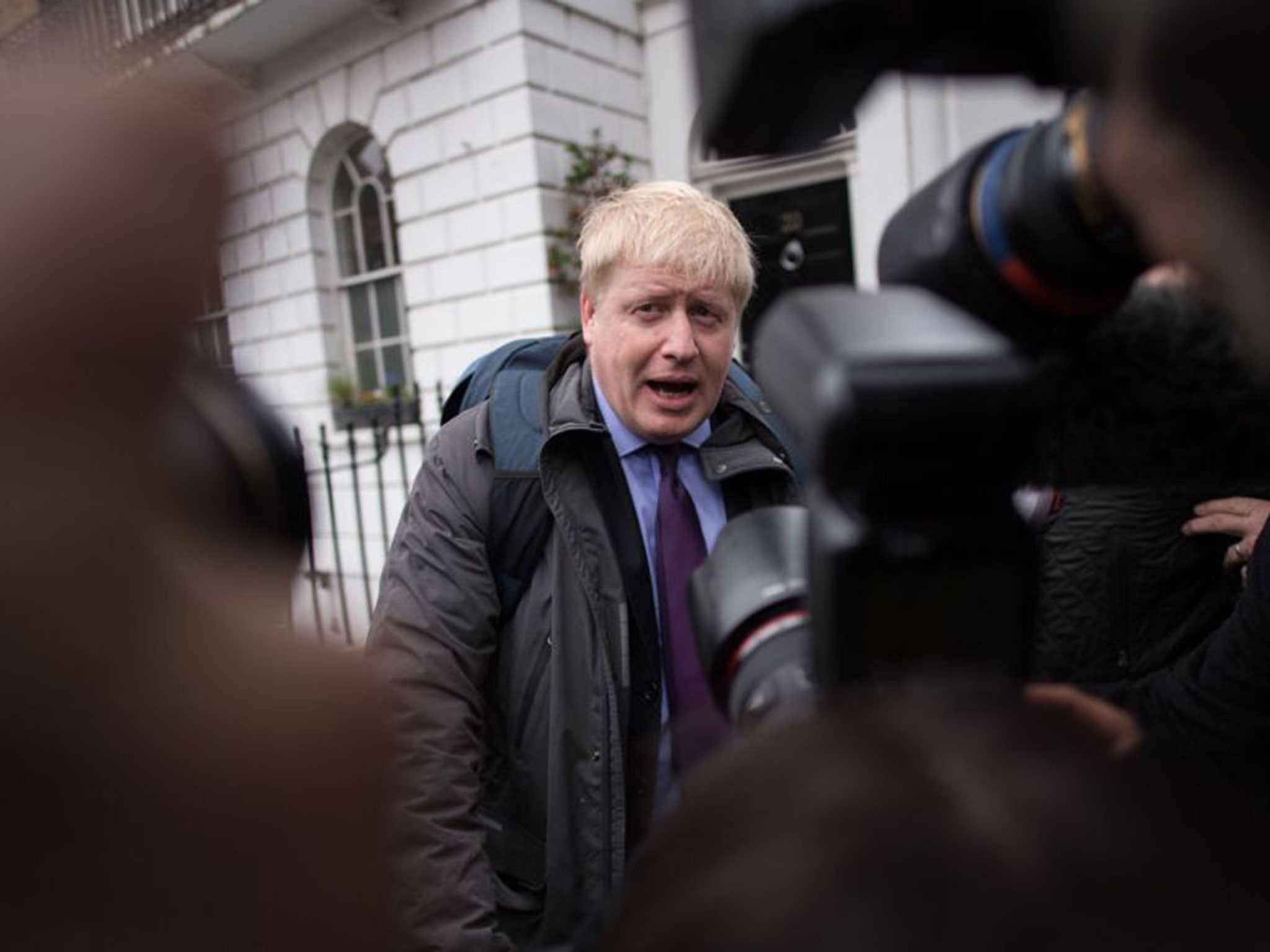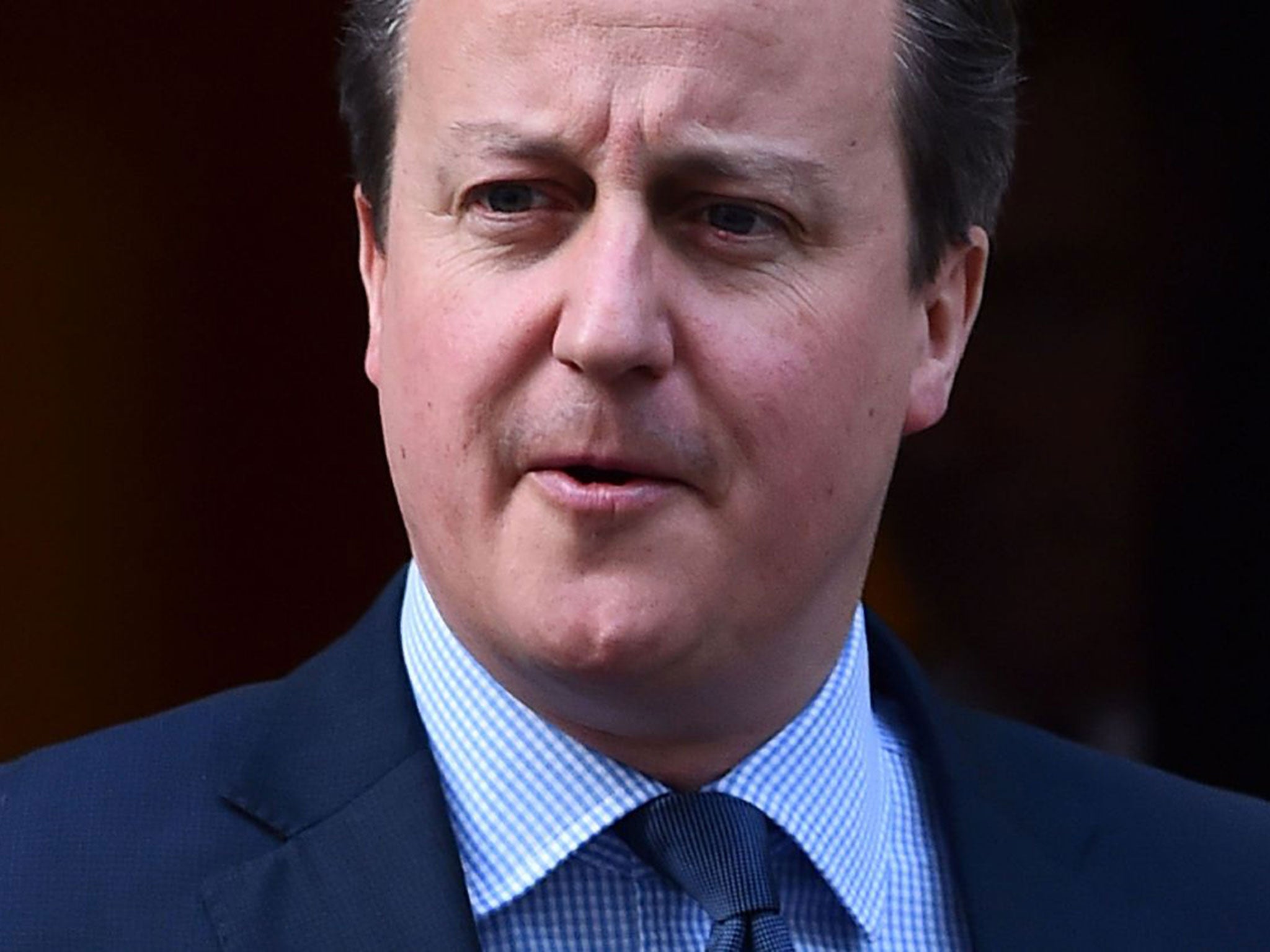Boris Johnson put his political ambition to lead Tory Party ahead of UK interests, says David Cameron
PM launches withering attack on Mayor in Commons debate

Boris Johnson put his political ambition to lead the Tory Party ahead of the interests of Britain when he came out for Brexit, David Cameron has suggested, as the private enmity between the two men broke out in public for the first time.
In a withering attack on the London Mayor, Mr Cameron told MPs that Mr Johnson’s idea that a Leave vote could be a prelude to securing a better deal in a second referendum was “for the birds”.
And in a highly pointed remark he said that his own pledge to step down before the next general election meant he had “no agenda” other than the interests of Britain.
“I won’t dwell on the irony that some people who want to vote to leave apparently want to use a Leave vote to remain,” Mr Cameron said. “But such an approach also ignores more profound points about democracy, diplomacy and legality.”
He later added: “I am not standing for re-election. I have no other agenda than what is best for our country. I’m standing here telling you what I think.
“My responsibility as Prime Minister is to speak plainly about what I believe is right for my country.”
A furious Mr Johnson, who was seated behind Mr Cameron on the backbenches, heckled the Prime Minister during the attack at one stage shouting “rubbish, rubbish”.
Afterwards Downing Street aides made no attempt to deny that Mr Cameron had been referring to Mr Johnson when he talked about his ambition.
It is understood to be part of a deliberate strategy to question the motivation of the London Mayor for supporting Brexit and contrasting his position with that of other “outers” who have had “long and sincerely held views” on the EU.
“The only thing Boris is interested is in himself,” said a senior government source.

“To try to position his decision as an act of conviction is disingenuous. He has not held these views before. This is all about positioning himself for the leadership and getting enough support from Eurosceptic MPs to get him on ballot papers that go to members.”
In his starkest warning yet over the consequences of a vote to exit Mr Cameron also told the Commons that his first act if he lost the referendum would be to trigger Article 50 of the Lisbon Treaty setting the UK on the path to leave the EU within a maximum of two years.
“This process is not an invitation to rejoin; it is a process for leaving,” he said.
“Sadly, I have known a number of couples who have begun divorce proceedings, but I do not know any who have begun divorce proceedings in order to renew their marriage vows.”
Mr Cameron went on to make an appeal to Tory MPs on the Conservative backbench 1922 Committee for each side to show “restraint and mutual respect”. Steve Baker, a prominent Tory outer said that he had asked Mr Cameron “to show the same to Boris”.
But with many pundits suggesting that Mr Johnson’s decision could boost the Leave campaign, financial markets reacted – with the pound falling to a six-year low against the dollar over fears that Brexit could become a reality.
The Italian Prime Minister Matteo Renzi warned Britain of the consequences of a leave vote on trade and jobs. “The consequences would be worse for English citizens than those in Europe in the sense, that, while we hope it doesn’t happen, if UK leaves Europe, the principle problems would be for the UK, for your companies and your businessmen and for your people.
“Put crudely, in my opinion it’s not only right that the UK remains in Europe, it’s important for you [the British].”

This sentiment was echoed by a letter signed by dozens of FTSE 100 business that warned they needed “unrestricted access to the European market of 500 million people in order to continue to grow, invest and create jobs”.
“We believe that leaving the EU would deter investment and threaten jobs [and] put the economy at risk,” they added.
In the Commons Mr Cameron faced questions from dozens of hostile members of his own party on the deal he had achieved in Brussels – while most of the support came from the Labour benches. But he insisted that what he had negotiated did amount to a meaningful resetting of Britain’s relationship with Europe that would give the country the “best of both worlds”.
“We will be in the parts of Europe that work for us, influencing the decisions that affect us and with the ability to take action to keep our people safe; but we will be out of the parts of Europe that do not work for us,” he said. “We will be out of the euro, out of the eurozone bailouts and permanently and legally protected from ever being part of an ever closer union.”
As Mr Cameron was speaking the Government published a White Paper outlining the new agreement struck in Brussels that revealed that recent European migrants claim 10 per cent of in-work benefits for low-paid workers, even though they make up six per cent of the workforce.
The figures from the Department for Work and Pensions showed about 40 per cent of recent migrants from the EEA live in households receiving benefits.
Among those claiming benefits, families received an average of almost £6,000 a year in tax credits, and 8,000 families got more than £10,000 a year.
Under the new agreement, Britain would be able to apply for a seven-year “emergency brake” under which new migrants will receive the right to claim in-work benefits only gradually over the course of four years. The document also confirmed that about 20,000 EU migrants were claiming child benefit in 2015 for a total of 32,000 children living overseas. Under the new arrangements, the benefit will be paid at the rate of the child’s home country for all new migrants and for existing claimants from 2020.
Key issues: Referendum talking points
National security
The argument that Britain will be safer in a reformed EU is central to David Cameron’s case, insisting that continued membership will make it easier to work with other European nations to combat cross-border crime and terrorism. This is also the clinching argument for Home Secretary Theresa May, who faced a Tory revolt two years ago when she led moves for the UK to opt into the European Arrest Warrant and 34 other measures.
The Leave campaign says membership makes Britain vulnerable to terrorism. Iain Duncan Smith has argued that the EU’s open borders “leaves the door open” to Paris-style attacks.
Sovereignty
Anti-EU campaigners say a vote to leave would restore sovereignty to the UK, making Parliament and British courts supreme in making and interpreting the laws of the land.
Mr Cameron says such claims over sovereignty are “an illusion” and that in order to have access to the single European market we would have to agree to all the same laws and regulations that the Out campaigners want to repatriate. In addition, the In campaign says we would have no say on future rules and regulations, but would still have to abide by them.
Cost
The Out campaign says that over the past decade Britain has paid more than £150bn to the EU budget – sending about £350m to Brussels every week.
The In campaign says the UK’s annual net contribution to the EU – what we put in but don’t get out directly – amounts to just £340 per household. It claims that on top of this EU membership is worth £3,000 for average households through lower prices, extra jobs and increased investment.
Trade and Jobs
The Out campaign says that outside the EU we would never have to sign up to trade deals such as the controversial TTIP agreement with the US. It adds that there is no reason why British trade with the rest of Europe should fall off as other European countries will be as keen to trade with us as they were before.
The In campaign, in contrast, says that outside the EU trade with European countries would suffer and Britain would attract less inward investment as companies would rather be located inside the EU than outside. This, it claims, would hit UK businesses and growth, putting millions of jobs at risk.
Immigration/Benefits
Disquiet over levels of immigration to the UK was a key early factor in Mr Cameron’s drive for reform. His initial hopes of a cap on migrant numbers were quickly abandoned and replaced with moves to curb EU nationals’ entitlement to benefits. The Prime Minister argues the moves will reduce the “pull-factor” to Britain.
The lack of power to control numbers coming to Britain is a key message for the Brexit camp. It argues that the UK will only get to grips with unprecedented rates of immigration when it regains full control of its borders.
Nigel Morris and Oliver Wright
Join our commenting forum
Join thought-provoking conversations, follow other Independent readers and see their replies
Comments